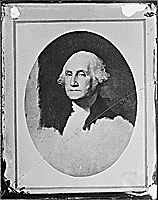|
George Washington - 1st President of the United States

As
the first President of the United States of America, George Washington (1789-1797)
is recognized by Americans as "The Father of His Country."
The earliest known image in which Washington is identified as such is on the cover
of the circa 1778 Pennsylvania German almanac, Lancaster: Gedruckt bey Francis
Bailey. This identifies Washington as "Landes Vater" (Father of the
Land).
Career
Washington was part of the economic and cultural elite of the slave owning planters
of Virginia. As a youth, he was trained as a surveyor and helped survey the Shenadoah
valley in Virginia.
French and Indian War
Washington was commissioned in 1754 as an Colonel in the Virginia Militia and
served with Edward Braddock of the British Army during the French and Indian War.
During the battle of the Forks of the Monongehela he had three horses shot out
from under him. He showed his coolness under fire in organizing the retreat from
the debacle. Washington then organized the First Virginia Regiment, which saw
service through the war; however, Washington left the Regiment to serve in the
House of Burgesses.
Between Wars
Following his miltiary service, in 1757 he married Martha Dandridge Custis, the
wealthy widow of Daniel Parke Custis. The newlywed couple moved to his estate
Mount Vernon where he took up the life of a genteel farmer. He became a member
of the House of Burgesses. He was initiated as a Freemason in Fredericksburg,
Virginia, on 4 February 1752.
American Revolution
On July 3, 1775 he assumed command of the Continental Army in the American Revolutionary
War. After successfully driving the British out of Boston, Washington lost the
Battle of Long Island in 1776 and retreated to Valley Forge, outside of British-held
Philadelphia, where the American forces recovered. On December 25, 1776, Washington
led the American forces crossing the Delaware to attack Hessian forces in Trenton,
New Jersey. The successful attack built morale among the pro-independence colonists.
Washington retained an army in being throughout the Revolution, keeping British
forces tied down in the center of the country while Generals Gates and Benedict
Arnold won the battle of Saratoga in 1777. This victory led to French recognition
of the United States.
In 1781, Washington, commanding both American and French forces, besieged General
Cornwallis at Battle of Yorktown, Virginia. The British surrender there was the
effective end of British attempts to quell the Revolution. In 1783, by means of
the Treaty of Paris, Great Britain recognized American independence.
Postwar Activities
After the war, he presided over the American Constitutional Convention in 1787.
He was elected President in 1788 and 1792. Washington remains the only president
unanimously elected by the Electoral College.
Citizen Genet
In 1793, The revolutionary government of France sent diplomat Citizen Genet, who
attempted to turn popular sentiment towards American involvement in the war against
Great Britain. Genet also was authorized to issue letters of marque and reprisal
to American ships and gave authority to any French consul to serve as a prize
court. Genet's activities forced Washington to ask the French government for his
recall
The Whiskey Rebellion
In 1791, the Federal government imposed an excise tax on whiskey. This tax
was highly unpopular on the American frontier, and in July, 1794, in Allegheny
County, Pennsylvania, a Federal marshal was attacked by a mob and a regional inspector's
house was burned. On August 7, 1794, Washington called out the militias of several
states and led a force of 13,000 to suppress the unrest
Personal information
Washington's estate, Mount Vernon, is located in what is now a suburb of Washington,
D.C.
Admirers of Washington circulated an apocryphal (and questionable) story about
his honesty as a child. In the story, he wanted to try out a new axe and chopped
down his father's cherry tree. When questioned by his father, he gave the famous
non-quotation "I cannot tell a lie. It was I who chopped down the cherry
tree." The story first appeared after Washington's death in a naive "inspirational"
children's book by Parson Mason Weems, who has been rector of the Mount Vernon
parish.
Legacy in the contemporary U.S.
The capital city of the United States, Washington, D.C., is named for him.
The District of Columbia was created by an Act of Congress in 1790, and Washington
was deeply involved in its creation, including the siting of the White House.
At this time, the future site of the capital was a swamp, and Washington remained
largely marshland well into the 19th century. The capital was placed in the South,
rather than in the major towns of the North, as a compromise during the writing
of the United States Constitution in order to get Southern votes for important
compromises.
Washington also selected West Point, New York, as the site for the United States
Military Academy.
Washington State in the Pacific Northwest of the U.S. is also named for him,
the only state named for a president.
His image is on the one dollar bill and the quarter-dollar coin.
|
